As many U.S. states continue to lift coronavirus lockdown restrictions, some are pausing their reopenings in the face of worrisome data around new cases and hospitalizations. States like Texas, Arizona and Arkansas have seen a surge in infections, calling into question aggressive reopening strategies.
Officials at the Centers for Disease Control and Prevention said Friday additional lockdowns may be needed if rising infection data doesn’t improve, and some researchers are warning the resurgences in some states isn’t even the “second wave” that many feared — it’s still just the first.
MovingMarkets’ live coverage in this blog has ended — but for up-to-the-minute coverage on the coronavirus.
The data above was compiled by Johns Hopkins University.
8:06 a.m. ET — Spain will reopen its borders to its fellow Schengen countries ten days earlier than originally planned, Spanish Prime Minister Pedro Sanchez said Sunday. The reopening date will now be June 21, and applies to all countries in the EU’s customs-free Schengen travel zone with the exception of Portugal, where the border will be opened on July 1.
One of the hardest-hit countries by the coronavirus, Spain is still not open to tourists and arrivals in the country are required to self-quarantine for 14 days. Spain’s government has previously said that from July 1, tourists would be able to enter the country without having to quarantine. —Natasha Turak
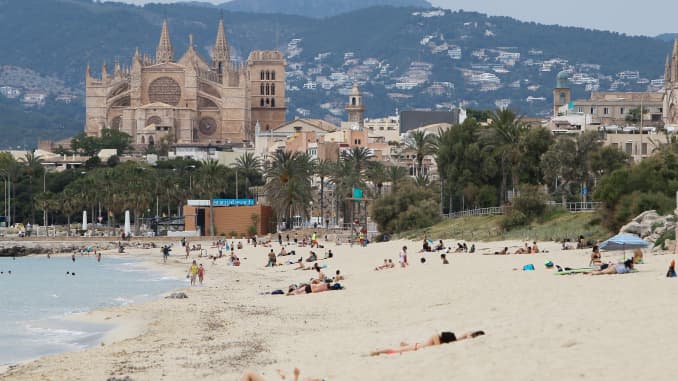
9:00 a.m. ET — U.K. Prime Minister Boris Johnson said Sunday that the country’s two meter (6.56 feet) social distancing rule was under review as national coronavirus case numbers come down.
“As we get the numbers down, so it becomes one in 1,000, one in 1,600, maybe even fewer, your chances of being two meters, or one meter, or even a foot away from somebody who has the virus is obviously going down statistically, so you start to build some more margin for manoeuvre,” Johnson said on Sunday.
“We’ll be looking at that and keeping it under constant review as we go forward to the next step in our plan, which is as you know July 4.” —Natasha Turak
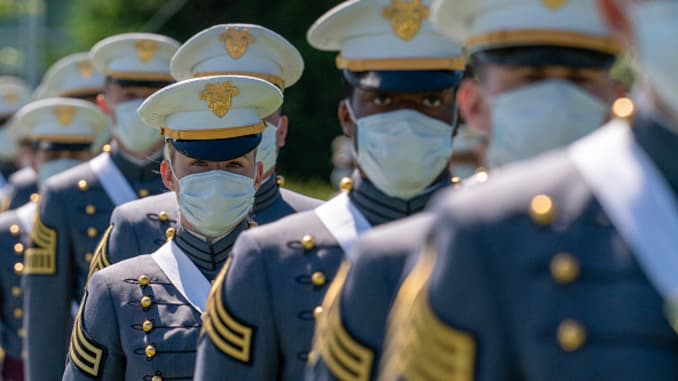
2:50 p.m. ET — Despite the coronavirus pandemic, the United States Military Academy at West Point graduated more than 1,000 cadets in an in-person ceremony, adapted with social distancing measures aimed at preventing transmission of the disease.
Cadets left the academy on March 6 when the pandemic hit and only the graduating seniors were allowed to return for Saturday’s event. The cadets, informally referred to as members of “The Long Gray Line,” took their oath at the Plain at West Point instead of Michie Stadium, the usual venue.
Their families and other guests were not allowed to attend. Trump’s speech to the Army’s new second lieutenants comes at a particularly tumultuous time, which the president appeared to acknowledge in his address.
“When times are turbulent, when the road is rough, what matters most is that which is permanent, timeless, enduring and eternal,” Trump said. —Amanda Macias
12:41 p.m. ET — AstraZeneca CEO Pascal Soriot told reporters the drugmaker is in talks with Japan, Russia, Brazil and China on eventual supplies of the company’s Covid-19 vaccine, Reuters reported.
Earlier in the day, Italy’s health minister announced a deal between AstraZeneca and that country as well as Germany, France and the Netherlands. The company’s vaccine candidate will soon move into phase 3 trials having already met benchmarks for efficacy and safety, according to the Reuters report.
Brazil and Russia are among the hardest hit nations amid the coronavirus pandemic, trailing on the U.S. in total infections, based on data from Johns Hopkins University. —Sara Salinas
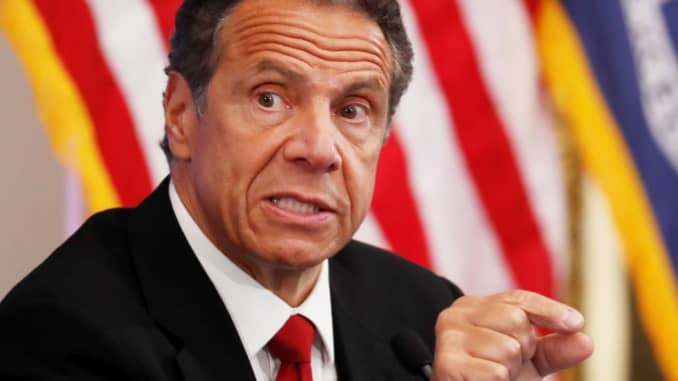
12: 03 p.m. ET — New York has reached the lowest number of coronavirus hospitalizations and deaths since the start of the outbreak in March, Gov. Andrew Cuomo said.
Cuomo warned that New York is an anomaly in the country because the state’s numbers continue to drop during a gradual reopening, which is not the case in other states that lifted restrictions and saw a spike in virus cases. Fourteen states have seen a surge in cases of more than 25% in the past week.
“Look around the nation and look what’s going on,” Cuomo said at a press conference. “The signs across the country are frightening … The beast is rearing its ugly head. Be careful.”
New York currently has the lowest rate of transmission in the country. Thirty-two people died on Friday from the virus, the governor said. —Emma Newburger
10:45 a.m. ET — The $600 enhanced unemployment benefits created by the CARES Act are scheduled to end July 31, and that could be bad news for unemployed workers who are relying on that additional cash to make ends meet during the coronavirus pandemic, CNBC’s Greg Iacurci reports.
Nearly 30 million people are currently receiving unemployment benefits, the largest number of unemployed workers since the unemployment insurance system was created in the 1930s.
While Democrats are looking to extend these payments, Republicans seek to end them after a slight bump in job gains last month. However, there are many who still cannot return to work and depend on those enhanced benefits for their livelihood. —Sarah Whitten
10:15 a.m. ET — As activists bring their phones to the streets to document widespread protests for racial justice, some are beginning to fear how they, too, are being documented.
Dozens of lawmakers have called on government agency heads to reveal how they are using technology to track and surveil the protests that have followed the death of George Floyd, a Black man who died after a white police officer knelt on his neck for nearly nine minutes during an arrest. And a sweeping police reform proposal places restrictions on body camera usage and data retention.
Privacy researchers say a lack of regulation requiring transparency around law enforcement’s use surveillance and facial recognition technology makes it difficult for citizens to know what they’re up against. Combined with the digital contact tracing efforts being pushed by public health officials to combat the Covid-19 pandemic, privacy advocates fear a slippery slope into further surveillance that could stifle speech.
In the interim, tech companies that supply location data and facial recognition have taken it upon themselves to stop supplying their technology to law enforcement officials. IBM, Amazon and Microsoft all have taken steps to cut off law enforcement use of their facial recognition tools, citing a lack of robust ground rules. And Foursquare has decided not to make analytics on protest data available to its clients. —Lauren Feiner
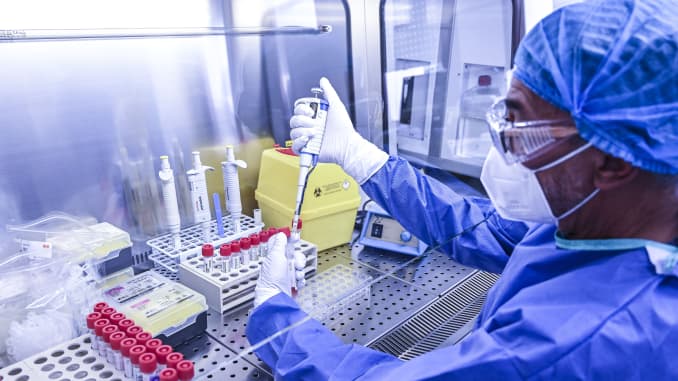
9:21 a.m. ET — Italy, Germany, France and the Netherlands have signed a contract with AstraZeneca to provide European citizens with a coronavirus vaccine, Italy’s health minister Roberto Speranza said, according to a Reuters report. The contract will supply 400 million doses of the vaccine.
AstraZeneca’s vaccine is currently in development with the University of Oxford and its experimentation phase is expected to be completed in the fall. Speranza said the first batch of doses would be available at the end of the year, Reuters reported.
EU governments issued a mandate on Friday instructing the European Commission to negotiate advance purchases of promising Covid-19 vaccines. However, it’s unclear if there would be enough money available for these purchases. —Sarah Whitten
9:15 a.m. ET — San Francisco doctors who risked their lives and volunteered to help coronavirus patients in New York have now returned home – and they are urging people to follow public safety guidelines, CNBC’s Christina Farr reports.
“A lot of people are feeling done with this pandemic,” said Dr. Ethan Weiss, a cardiologist based in San Francisco. “They don’t understand this is how it is going to be for a while.”
As states begin to re-open, people are itching to resume life after months of lockdowns. However, the virus is still spreading across the country and public health experts are concerned about the reported increase in diagnosed cases and hospitalizations in some states. —Emma Newburger
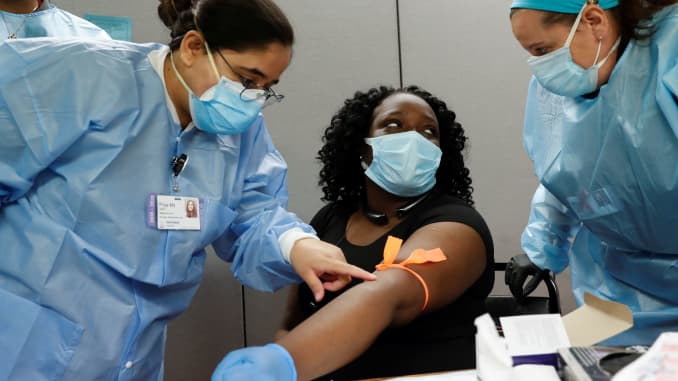
9:07 a.m. ET — Testing for Covid-19 is booming, as states ramp up capacity in an effort to clear the way for economic reopening. But getting tested isn’t always as simple as it sounds.
There are two main types of tests — viral and antibody — and lingering unknowns around the results. CNBC’s Cory Stieg breaks down the process and the takeaways of coronavirus testing. —Sara Salinas
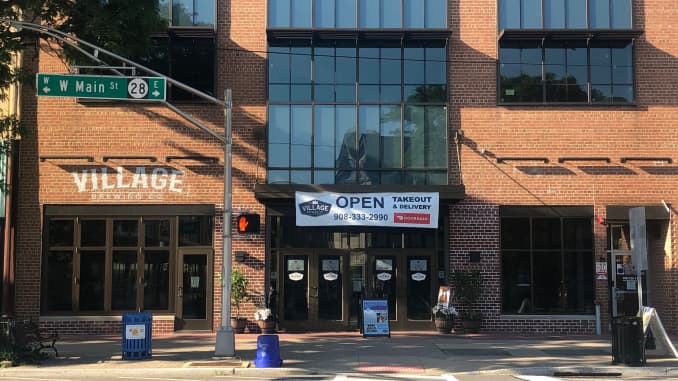
9:04 a.m. ET — With New Jersey set to shift into its next phase of reopening on Monday, business owners in Somerville are getting ready to salvage what remains of the usually bustling summer season.
Businesses on Somerville’s popular Main St. like Village Brewing and Verve Restaurant have endured more than 12 weeks of closure already, but on Monday, they’ll be able to partially open for outdoor service. Town officials and business owners are petitioning the state to close Main St., a state highway, to traffic so that retailers and restaurants can bring their business entirely outdoors, where the virus appears to spread less easily.
For Somerville, the pandemic hit right in the middle of something of an upswing for the town, which was attracting new businesses and younger residents in recent years. Depending on the severity of the pandemic’s economic impact and the speed of the rebound, the threat could be existential for many on Main St.
“We would be naive to think that any of us, or any district, no matter where you are in the country, is going to come out of this situation completely unscathed,” Natalie Pinero, executive director of the Downtown Somerville Alliance, said. “I think that there is a genuine concern for our businesses.” —Will Feuer
8:31 a.m. ET — As local economies reopen and lockdown restrictions lift, small town businesses face uncertainty around a restart to operations.
The pandemic issued a swift, clean halt to business for many. But returning isn’t as cleanly laid out for business owners like Russ Loub, who runs a steakhouse in the college town of Manhattan, Kansas. Loub estimates coronavirus shutdowns resulted in 4,000 canceled reservations almost instantaneously, and he now wonders what the fall football season will look like with a modified college semester.
“There’s so much unknown. That’s really the most difficult part of it,” Loub told CNBC’s Jesse Pound. “I’m sure if you talk to anyone else, they’ll tell you the same thing. It’s the unknown things that are the scariest.” —Sara Salinas
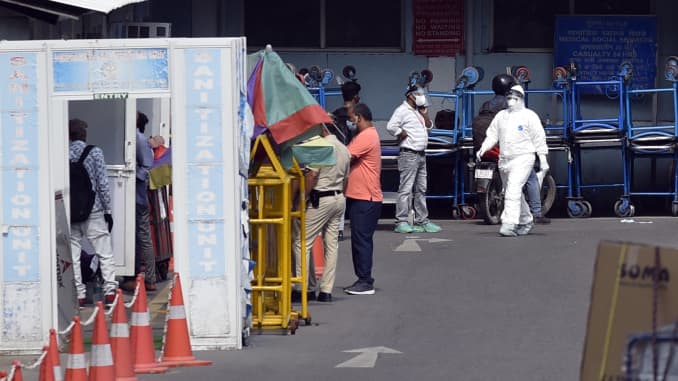
8:07 a.m. ET — India reported 11,458 new cases of the coronavirus on Saturday, the highest single-day increase for the country to date, the Associated Press reports. The jump pushes the nation’s total infections past 300,000 to 308,993.
The Health Ministry recorded 386 coronavirus-related deaths, bringing the total to 8,884, according to the AP.
The nation of 1.3 billion people instituted a strict lockdown in late March, but last week began reopening shopping malls, houses of worship and restaurants, the AP reports. Since reopening, the country has recorded close to 100,000 new cases of Covid-19.
